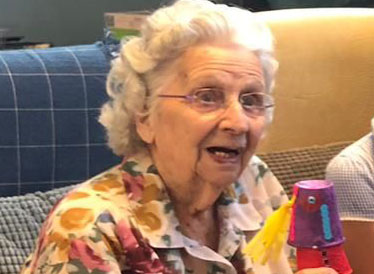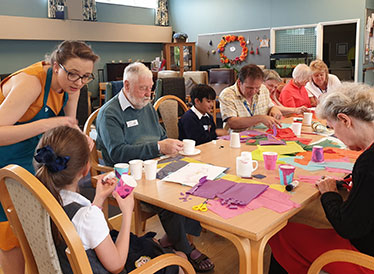On 11-13 October, the biennial Tunbridge Wells Puppetry Festival (TWPF) returns for a third edition of world-class puppetry from the UK and Europe. Always looking for new ways to be innovative, in the build up to this year’s event there’s been a project that brings together the talents of primary school children and older people for something very special.
A new dimension
Staff and visitors to Age UK Tunbridge Wells are no strangers to puppetry, having partnered with the Tunbridge Wells Puppetry Festival (TWPF) to assist those with dementia to tell stories by prompting memories. This time, however, there was an intergenerational element to proceedings, with the older people joined by children from a local school.

“We wanted to continue the relationship with those people living with dementia, having had a really good start with the Shadow Play project last year,” explains Linda Lewis, the director of TWPF. “There’s been a lot of news and information on how beneficial it is for older people to be in the company of younger people and what they can learn from each other, and this particular project has brought together different generations to encourage communication, respect and trust through the sharing of stories and experiences. The puppetry at the heart of the sessions has also helped build the fine motor skills of those taking part.”
Inspired by these possibilities, Linda contacted the nearby St Barnabas Primary School, who were delighted to get involved and put forward their Year 3 Maple Class. They joined the Tuesday guests at Age UK Tunbridge Wells for a voyage beneath the waves.
Under the sea
The resulting project was called Sea of Stories, which was delivered by a Sussex-based puppet theatre company called Rust & Stardust. The nautical theme was selected because it was a topic that was easy for everyone to understand, as lots of the older people had memories of beach holidays. One man had been a sailor who’d travelled around the world, so was subjected to excited questions from the children about his adventures over the years.
“The children came bounding in, giving the older people handshakes and high fives,” says Linda of the easy introductions. “It amazed me how noisy it was once everyone got down to being creative but the older people didn’t mind at all. They enjoyed it because it made things very lively and jolly.”
The older people were similarly excited about the project, according to Jo Marks, Dementia Support Service Manager at Age UK Tunbridge Wells. “They looked forward to being creative and seeing their new workmates. On Tuesdays they would arrive and ask, ‘Are the children coming today?’ They also enjoyed the change in routine and the innovation of the project.”

Positive outcomes
“What’s interesting is how the pairings would form relationships and how the groups would continue to work together over the six weeks of the project,” explains Linda. “I’d hoped they’d build successful relationships, which they did. What I hadn’t anticipated was how much the younger people helped the older people with their puppets. Many of the older people found it difficult to manipulate their puppets, because they didn’t have the flexibility in their hands they once did.”
On 9 July, at the end of the six-week project, everyone showed their puppets and the younger participants, many of whom had proud parents in attendance, created a play for the older ones. “It was a wonderful thing to see,” says Linda.
Jo agrees. “It would be great to continue this kind of intergenerational work, which is ideally suited to arts and performance projects such as singing and storytelling.”

